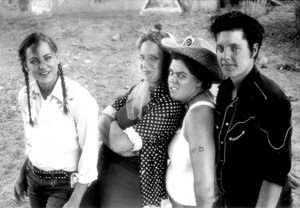 DORI APPEL is the author of fourteen full-length plays, nineteen one-acts, shorts and monologues, and more than fifty published poems and stories. Her plays have been produced throughout the United States and internationally, and her poetry and fiction have been featured in dozens of magazines and anthologies including "When I Am an Old Woman I Shall Wear Purple," and "The Best Is Yet To Be," the audio recording of which was a 1997 Grammy finalist.
DORI APPEL is the author of fourteen full-length plays, nineteen one-acts, shorts and monologues, and more than fifty published poems and stories. Her plays have been produced throughout the United States and internationally, and her poetry and fiction have been featured in dozens of magazines and anthologies including "When I Am an Old Woman I Shall Wear Purple," and "The Best Is Yet To Be," the audio recording of which was a 1997 Grammy finalist.Dori won the prestigious Oregon Book Award in Drama in 1998, 1999 and 2001. First, for Freud's Girls, a drama in which Freud's secrets are revealed with help from Virginia Woolf and Anais Nin. The second award was for The Lunatic Within, a revue-style comedy/drama about everyday oddities and ordinary madness. And the 2001 Drama Award was for Lost And Found, a series of one-acts related by themes of loss and recovery. The list of awards Dori has won over the plays few years is dizzying.

In August, Dori and Carolyn participated in their first poetry slam. "To our astonishment sixty people showed up at a gallery in Ashland on a Thursday night. And to our further astonishment, I took first place and Carolyn second!"
The dynamic duo just might demonstrate their slam flair in Newport. They for sure will be performing selections from the award-winning The Lunatic Within, and Lost and Found, plus from their co-authored play, Girl Talk.
To learn more about Dori, visit her website at www.doriappel.com















